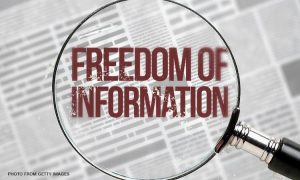By Omidiji Olamilekan and Lilian Efobi
Freedom of information refers to citizens’ right to access public records or information. It is a constitutional entrenchment that gives every citizen the right to access information from government institutions and agencies. Access to information is crucial to the development of any democratic government; it is a veritable indispensable tool. However, many constraints have been observed over the years of its implementation in Nigeria.

This revolutionary law provides a good opportunity to test the broader issue of the government’s commitment to transparency, accountability, open government partnerships and good governance. The concept of a FOI law for Nigeria became popular in 1993 by the activities of different civil rights organisations. The aim was to establish as a legal principle the right of access to documents and information in the custody of the government.
Since passage, there is a lingering contention on the applicability of the FOI Act in states. Femi Falana, a Senior Advocate of Nigeria, noted thus: “There are two conflicting judgments of the Court of Appeal on the applicability of the Freedom of Information Act in the states. One says that it is applicable throughout the country. Another one says that it is not applicable to states because it is a federal enactment. Apart from Ekiti State, which has a Freedom of Information Law, other state governments prefer to hide under the judgment of the Court of Appeal that says that the FOI Act is not applicable to the states.”
In different court proceedings on the FOI, many Justice has concluded that the FOI act covers the whole of Nigerian states just like the EFCC Act, among others, and that it aims to encourage accountability, transparency, and the rule of law, with the beauty of placing public interest above personal interest. Going by Section 4 of the Constitution of the Federal Republic of Nigeria, the National Assembly has the constitutional jurisdiction to enact the Freedom of Information Act. Therefore the provisions of the Act remains binding on all States of the Federation.
As of today, only Ekiti, Delta, and the Lagos States have domesticated the FOI Act. It implies that we still have many public officers and executive governors who are not supporting the FOI Act and thus actively frustrating the implementation in their states and serving as setbacks towards ensuring a transparent and accountable government. This is contrary to the tenets of a democratic system since democracy is all about an open, transparent, and accountable government. Lack of access to information is a recipe for corruption. Secrecy among public officials allows back-room deals determining public expenditure in the interest of the few rather than the many.
For a decade after the Freedom of Information (FOI) Act was passed in the country, no fewer than 16 states are yet to domesticate it or create comparative and parallel mechanisms that serve to promote transparency and accountability in government.
The 16 states include Imo, Anambra, Akwa Ibom, Edo, Osun, Ogun, Plateau, Kogi, Nasarawa, Niger, Kano, Sokoto, Bauchi, Adamawa, Taraba and Yobe and some of the excuses given by states ranged from the absence of organised records, blatant denial of access to information except through governors’ approval etcetera and it is evident that states are taking advantage of conflicting judicial pronouncements to indulge in this bad behaviour.
In all, if states feel they should not domesticate the law, then they should not be members of the Open Government Partnership. For citizens to reap the dividends of democracy, federal, state, and local governments must be accountable for their utilisation, including development funds donated by multilateral organisations. As a citizen, it is heartbreaking to know that nations are seeking ways to make their government open., while ours are demanding for court proceeding before access to information.
Moving forward, all stakeholders, including civil society organisations and relevant Judicial bodies, should sit on the conflicting decisions of FOI applicability at the state level and ensure they are resolved for, with access to information, citizens can constructively contribute to government.